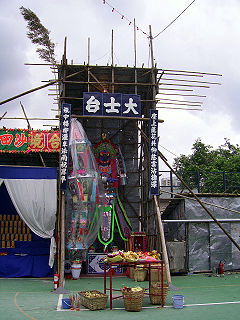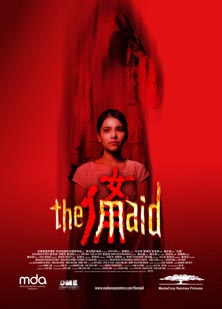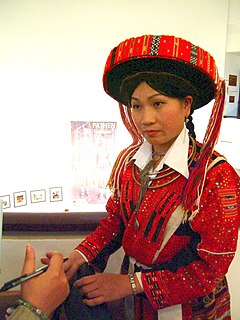
Hungry ghost is a concept in Chinese Buddhism, Chinese traditional religion, Japanese Buddhism and Tibetan Buddhism, representing beings who are driven by intense emotional needs in an animalistic way. The terms 餓鬼èguǐ literally "hungry ghost", are the Chinese translation of the term preta in Buddhism. "Hungry ghosts" play a role in Chinese Buddhism and Taoism as well as in Chinese folk religion The term is not to be confused with the generic term for "ghost" or damnation, 鬼guǐ. The understanding is that all people become such a regular ghost when they die, and would then slowly weaken and eventually die a second time.

The Ghost Festival, also known as the Zhongyuan Festival in Taoism and Yulanpen Festival in Buddhism, is a traditional Taoist and Buddhist festival held in certain East Asian countries. According to the Chinese calendar, the Ghost Festival is on the 15th night of the seventh month.

Obon or just Bon is a Japanese Buddhist custom to honor the spirits of one's ancestors. This Buddhist–Confucian custom has evolved into a family reunion holiday during which people return to ancestral family places and visit and clean their ancestors' graves when the spirits of ancestors are supposed to revisit the household altars. It has been celebrated in Japan for more than 500 years and traditionally includes a dance, known as Bon Odori.

Joss paper, also known as incense papers, are papercrafts or sheets of paper made into burnt offerings common in Chinese ancestral worship. Worship of deities in Chinese folk religion also uses a similar type of joss paper. Joss paper, as well as other papier-mâché items, are also burned or buried in various Asian funerals, "to ensure that the spirit of the deceased has sufficient needs in the afterlife." In Taiwan alone, the annual revenue of temples received from burning joss paper was US$400 million as of 2014.

Despite having a flourishing Chinese and Malay film industry in the 1950s and 1960s, Singapore's film industry declined after independence in 1965. Film production increased in the 1990s, which saw the first locally-produced feature-length films. There were a few films that featured Singaporean actors and were set in Singapore, including Saint Jack, They Call Her Cleopatra Wong and Crazy Rich Asians.

Preta, also known as hungry ghost, is the Sanskrit name for a type of supernatural being described in Hinduism, Buddhism, Taoism, Chinese folk as undergoing suffering greater than that of humans, particularly an extreme level of hunger and thirst. They have their origins in Indian religions and have been adopted into East Asian religions via the spread of Buddhism. Preta is often translated into English as "hungry ghost" from the Chinese and East Asian adaptations. In early sources such as the Petavatthu, they are much more varied. The descriptions below apply mainly in this narrower context. The development of the concept of the preta started with just thinking that it was the soul and ghost of a person once they died, but later the concept developed into a transient state between death and obtaining karmic reincarnation in accordance with the person's fate. In order to pass into the cycle of karmic reincarnation, the deceased's family must engage in a variety of rituals and offerings to guide the suffering spirit into its next life. If the family does not engage in these funerary rites, which last for one year, the soul could remain suffering as a preta for the rest of eternity.

Golden Village is a cinema operator based in Singapore, fully owned by Orange Sky Golden Harvest of Hong Kong. It was initially set up as a 50:50 joint venture between Golden Harvest and Village Roadshow of Australia. It is the largest cinema chain in Singapore, operating 12 multiplexes and cineplexes in the country. It joined hands to open a cinema at Great World City, GV Grand. Started in 1992, it opened Asia's first multiplex, the Yishun 10 multiplex. The cinema has the extensive management, operational and marketing skills of Village, as well as broad depth of experience of Golden Harvest in both film distribution and production across Asia.

The Maid is a 2005 Singaporean horror film, directed by Kelvin Tong, telling of a maid recently arrived in Singapore from the Philippines. She has to acclimate herself to the customs of the Seventh Month, during which she struggles with supernatural forces. The maid is employed by a Teochew opera family, a family with many secrets, who give her a place to stay in their dilapidated shophouse.
This article is about the culture of the Malaysian state of Penang.

Fatal Frame II: Crimson Butterfly, is a Japanese survival horror video game developed and published by Tecmo in 2003 for the PlayStation 2. It is the second installment in the Fatal Frame series, and features an independent story with little relation to the first title. The story follows twin sisters Mio and Mayu Amakura as they explore an abandoned village and experience encounters with the paranormal. Their lives quickly become threatened when the village spirits begin to possess Mayu and target them as sacrifices for an ancient ritual. Players must use a camera with powers of exorcism to defeat enemies and uncover the secrets of the village.

The Pa Then are Pa-Hng-speaking people classified as an ethnic group of Vietnam. Most Pa Then live in Hà Giang and Tuyên Quang provinces, located in Vietnam's Northeast region. The Pa-Hng language belongs to the Hmong–Mien language family.
Genevieve Woo Marn Huong is a Singapore television journalist and news presenter with Mediacorp.
Tony Kern is a Singapore-based American film director, screenwriter, motion picture artist and film producer.

Chinese folklore features a rich variety of ghosts, monsters, and other supernatural creatures. According to traditional beliefs a ghost is the spirit form of a person who has died. Ghosts are typically malevolent and will cause harm to the living if provoked. Many Chinese folk beliefs about ghosts have been adopted into the mythologies and folklore of neighboring East Asian cultures, notably Japan, Korea, and Vietnam. Beliefs about ghosts are closely associated with Chinese ancestor worship, where much have been incorporated into Buddhism and in turn influenced and created uniquely Chinese Buddhist beliefs about the supernatural.

Ghost Sweepers is a 2012 South Korean comedy horror film about a group of shamans from across the nation who gather together for a grand exorcism at a small village notorious for dark spirits, as a young journalist gets sent to cover the story.

Thai folklore is a diverse set of mythology and traditional beliefs held by the Thai people. Most Thai folklore has a regional background for it originated in rural Thailand. With the passing of time, and through the influence of the media, large parts of Thai folklore have become interwoven with the wider popular Thai culture.

Bimoism is the indigenous religion of the Yi people, the largest ethnic group in Yunnan after the Han Chinese. It takes its name from the bimo, shaman-priests who are also masters of Yi language and scriptures, wearing distinctive black robes and large hats.

Mulian Rescues His Mother or Mulian Saves His Mother From Hell is a popular Chinese Buddhist tale first attested in a Dunhuang manuscript dating to the early 9th century CE. It is an elaboration of the canonical Yulanpen Sutra which was translated from Indic sources by Dharmarakṣa sometime between 265 and 311 CE. Maudgalyayana, whose abbreviated Chinese transliteration is Mulian, seeks the help of the Buddha to rescue his mother, who has been reborn in the preta world or in the Avici Hell, the karmic retribution for her transgressions. Mulian cannot rescue her by his individual effort, however, but is instructed by the Buddha to offer food and gifts to monks and monasteries on the fifteenth day of the seventh lunar month, which established the Ghost Festival. While Mulian's devotion to his mother reassured East Asians that Buddhism did not undermine the Confucian value of filial piety and helped to make Buddhism into a Chinese religion, it also reflected strong undercurrents of filial piety that existed throughout Indian Buddhism as evidenced through its canonical texts and epigraphical remains.